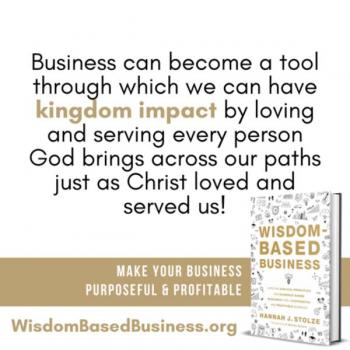International supply chain scholar Hannah Stolze joins Lipscomb College of Business faculty
Kim Chaudoin |

Hannah Stolze believes that getting a product from point A to point B is critically important to the success of organizations around the world, but that supply chain also has the power to positively impact the lives of those in the process.
Stolze is passionate about the transformative power of supply chain management and about inspiring and preparing future generations of business leaders to serve others in the process.
Lipscomb University’s College of Business, recognized across Tennessee and nationally as a leader in business education, recently appointed Stolze, international supply chain expert and US Army veteran, as director of its new Center for Transformative Sales & Supply Chain Leadership and associate professor of supply chain management.
Her research focus reflects her belief that business practices can positively impact the lives of customers and employees as she examines issues related to transformative and sustainable supply chain management, including environmental business practices, social impact of organizations on employees and society, integration of faith and ethics, and supply chain innovation.
“My recent research has been in transformative supply chain management and sustainability, both looking at social and environmental issues. The transformative space examines the impact of business on human flourishing,” explains Stolze. “Businesses know how to get customers to buy services and products, but are these services and products actually improving their lives? This is a more holistic approach that also takes a look at impact, not only on the customer but also on employees. Coming to Lipscomb in this season gives me a lot of opportunity just to kind of see that research grow, as well as to have a faith foundation to build on it. One of the pillars of trends in the corporate responsibility consumer space is wisdom, which I love especially with the faith-based application of that and being at a place like Lipscomb.”
This approach to business education coupled with Stolzes’ professional experiences is a good fit for one of Lipscomb’s rapidly growing programs.
“Dr. Stolze brings a tremendous amount of real-world supply chain and logistics experience to the build on our already strong foundation in supply chain and logistics education at Lipscomb University,” says Ray Eldridge, dean of Lipscomb’s College of Business. “Her international experience, connections and vision for preparing our students to be leaders in the vitally important supply chain industry provides our students an exceptional and unique resource that will prepare our students at the highest level.”

Stolze was selected as a Fulbright Scholar and carried out her grant at the Universitas Pelitas Harapan, Lippo Village, Indonesia from January to March 2020.
Stolze has a background with experience both in higher education and industry. Prior to her appointment at Lipscomb this spring, Stolze was executive director of the Center for Faith and Innovation and associate professor of marketing and supply chain management at Wheaton College. While there, Stolze was selected as a Fulbright Scholar and carried out her grant at the Universitas Pelitas Harapan, Lippo Village, Indonesia from January to March 2020. She was assistant professor of marketing and supply chain management at Florida State University from 2012-2015. In addition, from 2016-2018, Stolze was a research affiliate at the University of Arkansas Supply Chain Excellence Center, housed in the Sam Walton School of Business, focusing on women and diversity in logistics research.
“There are not many Christian colleges or universities in the country that have supply chain programs, and having the opportunity to be a part of one that has at its foundation strong core values and is faith-based is really exciting to me,” says Stolze, a Saint Louis, Missouri, native.
Along with her higher educational experience, Stolze also currently serves as founder and president of Wisdom-Based Business LLC, a wisdom-based business strategy audit and consultation services firm, and since 2009 has served as a marketing and supply chain strategy consultant for a variety of clients including the U.S. Department of Defense, BNSF Railroad and Frito-Lay among others. In addition, Stolze was responsible for global purchasing relationships and managed distribution coordination for a year at JumboSack Corporation and served as a specialist in the U.S. Army from 1999 to 2005.
Stolze holds a Bachelor of Arts degree in international political economics and Chinese from Carthage College; an MBA from Lindenwood University, a Master of Arts in biblical studies from Wheaton College; and a Ph.D. in business administration - logistics from the University of Tennessee-Knoxville.
Supply chain management is about making products available. It's complex, and it’s about problem solving. But what also comes with that is an enormous opportunity to impact people's lives, both within the organization throughout the world especially in regions where it is more challenging to deliver goods and services. So when you think about opportunities for people to have careers and grow corporately, for me, supply chain management is where it all happens, — Hannah Stolze
Interest in supply chain began to form during her Army career, Stolze says.
“At the end of the day, supply chain is all about product availability. In the Army, soldiers always need food, clothing and ammunition, and you never want to run out of those three things,” she explains. “So, I observed the process of making sure we always had the essential things we needed — and it was all dependent upon a process that worked to get those items to us. Supply chain management is what makes it all happen, and a well functioning process is critical.”
Marketing may bring customers to the table, but Stolze says that does not matter if an organization cannot get the product to its customers.
“Supply chain management is about making products available. It's complex, and it’s about problem solving. But what also comes with that is an enormous opportunity to impact people's lives, both within the organization throughout the world especially in regions where it is more challenging to deliver goods and services. So when you think about opportunities for people to have careers and grow corporately, for me, supply chain management is where it all happens,” she says.
The supply chain is a global operation as Stolze said it is difficult to find a system that involves a single nation. She said supply chain management involves much more than merely understanding manufacturing and logistics processes.
“You have to understand politics, economics and world culture at all levels in the supply chain process, whether you are a CEO, a buyer or an entry level employee who interacts with manufacturers in Asia on a daily basis,” says Stolze, who is trained as a Mandarin linguist and has spent significant time working in international business settings. “This is a unique field where practitioners get global experience early in their careers.”

Stolze's new book will be released April 13.
It is also a field that has been in the spotlight during the COVID-19 pandemic, with shortages of items such as toilet paper as well as the increase in online ordering and delivery through services such as Amazon.
“Supply chains have become more efficient over the last 20 years. I think what 2020 revealed was the opportunity not just for efficiency, but the opportunity to become more effective in terms of delivering to the customer,” reflects Stolze. “Of course there were companies, such as Amazon, that had the delivery piece in place when the pandemic hit. But what we saw were grocery stores and retail organizations that rose to the challenge during COVID, they are able to do either home delivery or curbside pickup. They were able to be agile and they did much better adapting during COVID.”
The pandemic also exposed disparity in terms of who companies and supply chains serve. Stolze said in the future she believes greater emphasis will be placed on supply chain effectiveness, how the customer is impacted.
“I think on the horizon is the conversation of how can we better serve people and be more effective, rather than about how to be more efficient,” she explains. “Efficiency is about cost savings. Effectiveness is about delighting the customer. I think the next phase of supply chain is not just positioning them for cost savings or to be competitive, but to really serve people better.”
Stolze has expanded on her experiences and insights in a new book, Wisdom-Based Business, set to be released on April 13. In this book, she draws principles from the Bible's wisdom literature and from evidence-based research to create a framework for business that is oriented toward excellence and sustainability. This book addresses issues such as the virtue of profit, servant leadership, wisdom-based values, beneficial outcomes of wisdom-based business and the ultimate outcome of eternal impact. The book is available for pre-order at amazon.com.
Learn more about Lipscomb’s supply chain management program in the College of Business.